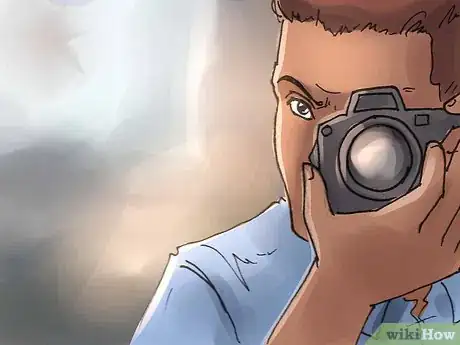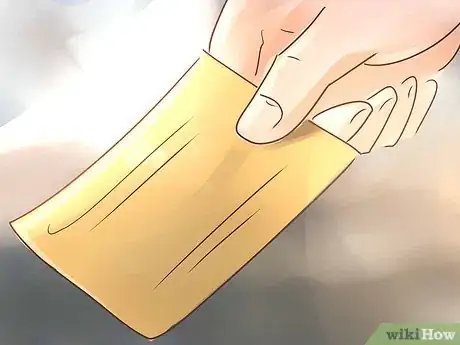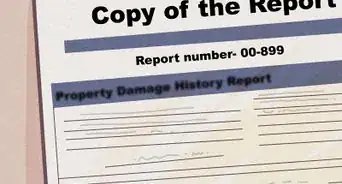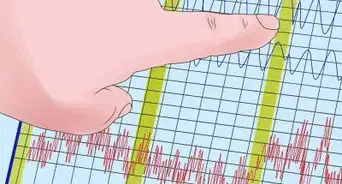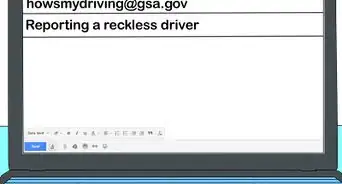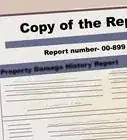This article was written by Jennifer Mueller, JD. Jennifer Mueller is an in-house legal expert at wikiHow. Jennifer reviews, fact-checks, and evaluates wikiHow's legal content to ensure thoroughness and accuracy. She received her JD from Indiana University Maurer School of Law in 2006.
This article has been viewed 22,708 times.
You come home to discover a window is broken. Then you realize your television is gone from the living room – and the DVD player, and your computer. As you look around, you realize you've been robbed. Burglary is not only one of the most common serious crimes, it's also one police often are unable to solve.[1] If you want to solve a burglary, you must act quickly to preserve any evidence and keep your eyes and ears open for possible clues.
Steps
Preserving Evidence
-
1Secure the scene. As soon as you discover a burglary, do as much as possible to keep animals or other people out of the room.
- Avoid touching anything that might be considered evidence until the police arrive. Although your fingerprints will be all over everything in your own home anyway, you don't want to disturb any evidence left behind by the perpetrator.
- Figure out how the burglar got into your home and check outside for signs such as tire marks or shoe prints.
-
2Determine what was stolen. Take inventory of your belongings and figure out what's missing or destroyed.
- If the burglars left things strewn about and you have difficulty picturing how things were before, you might look through your photos and see if you have any pictures of the room before so you can better recognize what is and isn't there.
- Avoid disturbing anything until police arrive, however. For example, if a bookcase was overturned, leave it as it is until police have seen it. Then you can move it and determine if its contents also were stolen.
- If you have a safe or a secret hiding place for valuables, check whether it has been discovered or disturbed.
- In addition to what was stolen, what wasn't stolen also may be valuable evidence, particularly if the burglar seemed to be targeting certain types of items but left things with obvious value. For example, the burglar may have stolen your movie and video game collection, but left your television and video game console.
- This information can provide clues as to the type of burglar who was in your home. For example, items such as televisions and video game consoles have serial numbers, so they can be tracked. Many electronics also have anti-theft tracking devices or software installed. Movies and video games, however, are virtually untraceable and can be easily sold at pawn shops or other stores that buy and sell used media. Therefore, a burglar who steals those items and leaves others probably is a rather risk-averse criminal who needed quick cash.
Advertisement -
3Photograph the crime scene. Photographs can help you see things you didn't notice before.
- You also want to have evidence of the way things looked. After the police have left, you will want to clean up and put things away, but having pictures could be valuable later.
- The way the burglar moved through your home and searched for things to steal may provide clues about the type of burglar he is, including his age and his level of experience. For example, a burglar who ransacked the place and destroyed other property in the process may be someone who is younger and more inexperienced, while if it's obvious specific items were targeted and nothing else was touched, the burglar is more likely to be someone with more experience who knew what he was after and what he could get rid of quickly and easily for maximum profit.[2]
-
4Look for anything left behind by the perpetrator. Sometimes the person who robbed you will leave dirty handprints, footprints, or other evidence.
- The sloppier the burglar was, the more evidence he or she probably left behind. Additionally, if the burglar broke windows or glass, either on the way into the home or during the course of the burglary, there may be blood from which police can extract DNA evidence.[3]
-
5Make note of anything unusual or out of place. Anything the burglar did that was unrelated to stealing your stuff could be part of the criminal's signature.
- These details may seem unimportant to you, but could become the key that unlocks the identity of the suspect – especially if police have noticed a pattern of similar crimes occurring in close geographic proximity.[4]
- Burglars often repeat not only the crime but the way they commit the crime, so evidence of unusual activity unrelated to the crime may help identify the perpetrator of several burglaries.[5]
- For example, some burglars have habits such as making a sandwich or playing video games while they're in the house. These activities can provide evidence as well as link your burglary to other pending or unsolved burglaries in the area.[6]
Filing a Police Report
-
1Call the police. You should report the crime as soon as possible after you discover you've been burglarized.
- Many burglaries go unreported, but reporting the incident quickly increases the chances that your property will be recovered or the perpetrator apprehended. Thieves tend to get rid of stolen items quickly, so the longer you delay the less hope you have of getting anything back.
- Since many burglars are repeat offenders, they may be well known to your local police.[7] [8]
-
2Talk to the officers who arrive on the scene. Providing the officer as many details as you have about the crime can help them trace leads and narrow the field of suspects.
- The officer will want to know when you discovered the burglary and how long you were away from home (assuming you weren't at home when the burglary happened). These details enable him or her to narrow the window of time during which the burglary took place.[9]
- Describe the items stolen in detail. If you have serial numbers for any electronic devices you should provide those as well. The more detail you can provide to the officer, the greater the chance your items will be recovered.[10]
- If you don't have serial numbers for stolen items, provide as many details as you can. If there are any identifying markings, make sure you share that information with the officer.[11] For example, if you have stickers on your laptop's case, you might describe them. If an item has any scratches or dents from wear and tear, the location of those defects also can help identify your property.
- The method of entry for the burglar can be important information, because if your burglar was a repeat offender, he may have found a favorite method that he uses every time. Additionally, the method of entry may provide clues about the type of burglar. For example, if the burglar entered in a way that would have caused a lot of noise or disruption, this might tell you that the burglar was reckless and not concerned about getting caught in the act.[12]
-
3Provide any evidence or information you've collected. If you've discovered anything unusual or any items left behind by the burglar, hand it over to the police.
- Additionally, if you have any photos of any of the stolen items, you might want to provide those to the police as well.[13]
-
4Exchange contact information. The officer may need to contact you as the investigation progresses, and you may need to update your report.
- Particularly if the room was ransacked or if there is overturned or broken furniture, you may not notice some items are missing until after you start cleaning up.
- While you probably will notice the absence of larger items right away, you may not realize smaller things are gone until several days after the burglary. Additionally, if the thief only stole parts of a larger collection, such as DVDs or video games, it may take some time for you to go through the remaining titles and figure out what's missing.
- Ask the officer if he or she will check other reports filmed around the same time as the incident to see if any other suspicious activity was reported in your area. The reports may be connected and may lead to the perpetrator.[14]
-
5Get a copy of the police report. You may have to go to the police station to get a copy of the written police report that the responding officer filed.
- If you have homeowner's or renter's insurance and plan on filing a claim, the insurance adjuster probably will need a copy of the police report for the claim records.
- Additionally, if any credit cards or financial information was stolen, you may need to provide copies of the police report to your bank or credit card companies when you report the theft to them.
Following the Paper Trail
-
1Talk to your neighbors. People who live nearby may have noticed something, or may have additional information about other burglaries in the area.
- If any of your neighbors have surveillance cameras, they may have captured the break-in or related activity on video.
- If you talk to anyone who has any additional information – for example, your neighbor describes a van parked in front of your home around the time of the burglary – make sure you call the police and update your report as well.
-
2Check your bank accounts or credit card statements. If any of your cards were stolen in the burglary, unauthorized charges can lead to clues that could help identify the burglar.
- You should report stolen cards to your bank or credit card company right away to limit your liability for any unauthorized charges, but there's a chance the card may have already been used.[15]
- If the card has been used at a location that has a security camera, you may be able to use the information from your statement regarding when the card was swiped to obtain video footage of the burglar.
- If you get any information about the suspects this way, make sure you provide the information to the police as soon as possible so they can be apprehended. Although police may need more evidence tying them to the burglary before they have probable cause to charge them with that crime, they may be able to identify them or charge them with a lesser offense in the meantime.
-
3Call local pawn shops. The burglar may try to sell the stolen property at pawn shops in the area.
- If something rare or distinctive was stolen, it's much more likely that you'll be able to find it than if it's a common item and you have no record of its serial number.
- Although pawn shops typically are required to check databases for stolen items, providing store owners or employees with a description of your items can help ensure they're keeping an eye out for them.
-
4Activate any trackers in electronic devices. If your phone or computer were among the items stolen, you may be able to locate them using built-in tracking technology that can find the device using GPS.[16]
- These trackers can help locate your device, or even the perpetrator of the burglary. However, let the police know if you've searched for your electronics in this way. It's safest for you if the police follow the lead, rather than if you go by yourself to retrieve your device.
-
5Consider using social media. Posting information about the burglary can lead to additional information and potential leads in your case.
- Encourage everyone who follows your accounts to share your post, even if they don't have any additional information for you.
- Particularly if you have any video or pictures of the suspect or the suspect's car, someone may be able to identify him or her – especially if you live in a relatively small town or rural area.[17]
References
- ↑ http://www.reviewjournal.com/news/most-burglaries-go-unsolved
- ↑ http://www.policemag.com/channel/patrol/articles/2010/01/burglaries.aspx
- ↑ http://www.policemag.com/channel/patrol/articles/2010/01/burglaries.aspx
- ↑ http://www.policeone.com/investigations/articles/2142763-Investigating-property-crimes-A-checklist-for-success/
- ↑ http://www.policemag.com/channel/patrol/articles/2010/01/burglaries.aspx
- ↑ http://www.policemag.com/channel/patrol/articles/2010/01/burglaries.aspx
- ↑ http://www.policemag.com/channel/patrol/articles/2010/01/burglaries.aspx
- ↑ http://www.policeone.com/investigations/articles/2142763-Investigating-property-crimes-A-checklist-for-success/
- ↑ http://www.policeone.com/investigations/articles/2142763-Investigating-property-crimes-A-checklist-for-success/
- ↑ http://www.policeone.com/investigations/articles/2142763-Investigating-property-crimes-A-checklist-for-success/
- ↑ http://www.policeone.com/investigations/articles/2142763-Investigating-property-crimes-A-checklist-for-success/
- ↑ http://www.policemag.com/channel/patrol/articles/2010/01/burglaries.aspx
- ↑ http://www.policeone.com/investigations/articles/2142763-Investigating-property-crimes-A-checklist-for-success/
- ↑ http://www.policeone.com/investigations/articles/2142763-Investigating-property-crimes-A-checklist-for-success/
- ↑ http://www.consumer.ftc.gov/articles/0213-lost-or-stolen-credit-atm-and-debit-cards
- ↑ http://www.policeone.com/investigations/articles/2142763-Investigating-property-crimes-A-checklist-for-success/
- ↑ http://www.waff.com/story/27831464/woman-turns-to-facebook-helps-solve-neighborhood-burglary
- ↑ http://www.reviewjournal.com/news/most-burglaries-go-unsolved


